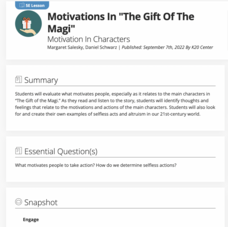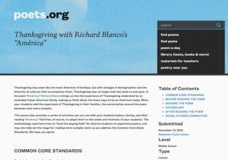K20 LEARN
It Wasn't Me: "The Crucible"
Scholars complete their study of the collective fear in Arthur Miller's "The Crucible" by conducting a mock trial to determine how many witches are in the class. Groups then analyze sections of the play for the literary devices used and...
K20 LEARN
It’s My Party and I’ll Hear What I Want To: Gatsby’s Party Playlists, The Great Gatsby and the Sense of Sound
Young scholars consider how film soundtracks can help support not only the mood but also the tone of a scene. After viewing two very different trailers for the same film, class members create their own soundtracks for two party scenes...
K20 LEARN
Motivations In "The Gift Of The Magi": Motivation In Characters
O. Henry's short story, "The Give of the Magi," launches a study of what motivates people to act as they do. Class members identify what they believe are the motivations of the characters in O. Henry's tale and then craft a one-page...
K20 LEARN
That Which We Call a Rose: Connotation and Denotation in Romeo and Juliet
Words carry weight. And some words carry baggage. Scholars learn the difference in a study of connotation and denotation. Individuals sort the cards into three groupings using words from Shakespeare's play. After sharing within groups,...
K20 LEARN
The Consequences of Time Travel: Analyzing Short Stories
Ray Bradbury's short story "A Sound of Thunder" is the anchor text in a lesson that asks high schoolers to find examples of cause, effect, and foreshadowing in the tale. They then create a brochure advertising trips with Time Travel, Inc.
K20 LEARN
Taking a Bite! Exploring Cultural Identity Through Food
High schoolers are asked to consider the connections between food, culture, and identity. They read articles and share what they learned in a jigsaw activity, read a short story, and make a claim about the story's theme, backing up their...
Global Oneness Project
The Importance of Indigenous Language Revitalization
Middle schoolers consider languages as representations of cultures and the importance of preserving various languages, especially the rapidly disappearing languages of indigenous peoples, in a lesson that tells the story of Marie Wilcox...
Curated OER
Sioux Chef Sean Sherman: A Rebirth of Native American Cuisine
Many families have special dishes they serve during holiday celebrations and get-togethers. Many of these recipes have been handed down from generation to generation and often come with stories. Introduce your middle schoolers to the...
K20 LEARN
You Think You Have Problems: Perspective in Multi-Genre Literature
Young scholars are asked to reflect on how personal experiences might influence points of view and perspectives. They read poems and biographies of the poets and then match the poem to the poet. To justify their matches, learners...
Curated OER
The Cultural Significance of Naming
The Navajo would disagree with Shakespeare that the naming of things is irrelevant. Navajo people have to earn their names. Middle schoolers learn about the cultural significance of Navajo names in a lesson that uses a video and reading...
Curated OER
Te Ata Fisher: The Award-Winning Chickasaw Storyteller
Storytelling is a time-honored way to keep a culture alive. Introduce middle schoolers to Te Ata Fisher, the famous Chickasaw storyteller who shared her stories, songs, and dances across the United States and Europe. Young historians...
Curated OER
What Exactly Is Food Sovereignty?
Something is happening here, and what it is is becoming increasingly clear. Middle schoolers investigate the connections between processed foods and health issues and the movement back, especially by Native Americans, to other food choices.
Curated OER
Celebrate Joy Harjo: The First Native American Poet Laureate
Introduce middle schoolers to Poet Laureate Joy Harjo with a lesson that not only explains the role and duties of the Poet Laureate but also contains a video in which Harjo explains what she sees as her responsibility as a Native...
Curated OER
Food Traditions: Making Cherokee Bean Bread
Imagine being forced out of your home and walking over 1,000 miles with only the things you could carry. How would you survive? What would you eat? After reading about the Trail of Tears and Cherokee resilience, middle schoolers are...
Academy of American Poets
Thanksgiving with Richard Blanco's "América"
Traditions, like the times, are a-changin'. Middle schoolers conduct a close reading of Richard Blanco's poem "América" and consider how Blanco's family approached his suggestions for adopting a new approach to their Thanksgiving meal.
Smithsonian Institution
Harvest Ceremony: Beyond the Thanksgiving Myth
There is a grain of truth in myths. Young historians investigate the truths surrounding the popular beliefs about the First Thanksgiving in Plymouth, Massachusetts. After reading the information in a study guide, they use what they...
Curated OER
Changemakers Lesson Plans
An astronaut, a fashion designer, a Secretary of the Interior, an actor, and an Olympic Gold Medal winner! Teens and tweens have an opportunity to be changemakers as they research modern Native Americans and their many accomplishments...
K20 LEARN
Worcester v. Georgia: Cherokee Sovereignty and Actions of the U.S. Government
Young historians study the Supreme Court case "Worcester v. Georgia" and note instances where the Justices defended the sovereign rights of the Cherokee. They also examine the actions of President Andrew Jackson and the provisions of...
K20 LEARN
Manifest Destiny: U.S. Territorial Expansion
A close examination of John Gast's painting "American Progress" launches a study of the concept of Manifest Destiny used to justify United States' policy of westward expansion. Young historians read statements from persons with different...
K20 LEARN
Analyzing Early American Figures: Analyzing History
Who were they? High school freshmen brush up on their research skills by investigating an important person in American history. They select a name, fill out a KWHL chart, and research why their person is important. Scholars then complete...
K20 LEARN
The Conflict at the Washita River: The Indian Wars in Indian Territory
"Battle" or "Massacre"? Words matter, especially when labeling historical events. That's the big idea in a lesson about the 1868 conflict at the Washita River. After examining two images of the event, groups read and discuss articles...
K20 LEARN
Reconstruction Treaties Of 1866: The Reconstruction In Indian Territory
The Reconstruction Treaties of 1866 and their impact on the Five Tribes in the United States Civil War are the focus of a lesson plan that asks young historians to consider how these treaties affected tribal sovereignty. Class members do...
Curated OER
Indigenous Peoples’ Day Lesson Plan
Indigenous Land Guardianship, Settler Colonialism, Racial Capitalism. While the terms may be new to some, they feature in a lesson plan designed for Indigenous Peoples' Day. Young scholars investigate four concepts: Land...
K20 LEARN
Transcending Boundaries - The Kiowa Six: The Legacy and Contributions of Six Kiowa Artists
The Kiowa Six, a group of Kiowa artists, are featured in the activity that asks young historians to consider the importance of art in representing a culture and contributing to a group's legacy. After examining paintings by the group and...

























